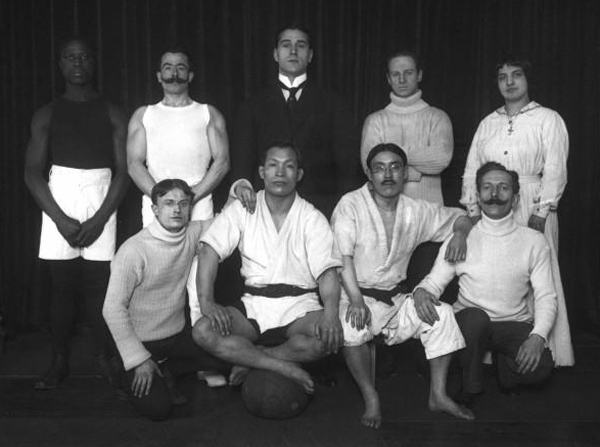
Although it was fairly common for Japanese jujutsuka to engage with Western boxers on the stages of Edwardian London’s music halls, the boxers normally simply wrestled according to jujutsu rules. Occasionally, however, a true mixed-styles bout did take place, as when former Bartitsu Club instructor Yukio Tani took on the pugilist known as Young Joseph or as in this instance, recorded in the Birkenhead News of August 25th, 1909, when Tani’s compatriot Taro Miyake exhibited his jujutsu skills against the boxer Charlie Knock.
The Miyake/Knock “turn” was, however, expressly announced as an exhibition, and it was noted that they would not attempt to hurt each other, so the actual performance was clearly more in the nature of a light sparring contest for demonstration purposes rather than a serious match. They repeated the exhibition at a number of music halls during August and September of 1909.
Noting as usual that the term “Jap” was not used pejoratively in Edwardian English and also that Taro Miyake’s name was frequently rendered by English journalists as “Tarro Myaki”.
AT THE OLYMPIA
A programme of quite exceptional excellence is submitted to patrons of this fine hall this week. From beginning to end the entertainment is of the highest class, and not a dull moment is experienced throughout.
The “top of the bill” is occupied by Tarro Myaki, the celebrated Japanese exponent of the Ju-Jitsu system of self-defence, who not only give a remarkable exposition of the science, but shows how he would defend himself against the attack of a skilled boxer. The representative of boxing is no less a person than Charlie Knock, the welterweight champion of England and the winner of many battles in the ring, so that it will be seen that the Jap has a foeman worthy of his steel.
On Monday evening Myaki endured a good deal of punishment, but brought each of three bouts to a close by throwing the boxer and rendering him helpless by the application of one or other of the “grips” or “holds”, practiced by the Ju-Jitsu expert. The demonstration was much appreciated.
Earlier in the evening a perhaps even more remarkable display of the value of a knowledge of Ju-Jitsu was given by Miss Clarice, the lady champion, who dealt effectually with a realistic looking ruffian impersonated by her partner Euzen, the “soldier juggler,” whose performance, by the way, was one of the features of the night’s entertainment. Every “attack” was foiled with consummate ease, and when the rough, baffled at every turn, produced first a cudgel, then a knife, and finally a revolver, he was even more severely dealt with. There can be no question that a knowledge of the Ju-Jitsu method of defending oneself is extremely valuable, and that the art is well worth the trouble of acquiring.
